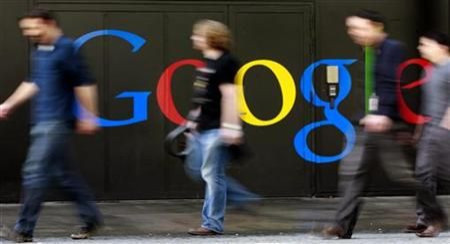Google cries foul on Apple, Microsoft mobile gang-up

Google Inc, fresh from losing a bid to buy thousands of patents from bankrupt Nortel, lashed out at its biggest rivals on Wednesday and accused them of banding together to block the Internet giant in the red-hot smartphone arena.
In a rare public outburst, Google Chief Legal Officer David Drummond blasted Microsoft, Apple, Oracle and "other companies" for colluding to hamper the increasingly popular Android mobile software by buying up patents, effectively imposing a "tax" on Android cellphones.
Apart from increasing costs for consumers, snapping up the patents will stifle technological innovation, he said.
"Microsoft and Apple have always been at each other's throats, so when they get into bed together you have to start wondering what's going on," Drummond wrote in a blog post.
He referred to "a hostile, organized campaign against Android by Microsoft, Oracle, Apple and other companies, waged through bogus patents."
Microsoft and Apple had teamed up to acquire patents previously owned by software maker Novell and bankrupt telecom firm Nortel Networks Corp. to ensure "Google didn't get them," Drummond added.
But Microsoft's General Counsel Brad Smith disputed Drummond's version on the Novell patent issue on Twitter.
"Google says we bought Novell patents to keep them from Google. Really? We asked them to bid jointly with us. They said no," Smith tweeted in response to the blog.
Representatives from Apple and Oracle declined comment.
Google -- which is facing a federal antitrust probe in the Internet search market it dominates -- is forging ahead in the smartphone market. But it has been hampered by a lack of intellectual property in wireless telephony, which has exposed it to patent-infringement lawsuits from rivals like Oracle.
It lost out on the Nortel patents to a consortium grouping Apple, Microsoft, Research in Motion and others, which together paid $4.5 billion.
Google individually had bid up to $3.4 billion for those patents before teaming up with Intel Corp, which on its own had bid up to $3.1 billion, according to a source familiar with the matter.
They bid through $4 billion and then tapped out, another source had told Reuters.
INCREASING PATENT LAWSUITS
The Android software, now used by phone makers including HTC, Motorola and Samsung, has rapidly overtaken Nokia to become the world's most popular smartphone platform, with about a third of the market.
Drummond said the company was looking to strengthen its patent portfolio. Google, whose crown jewel is its search algorithm, has never placed the same priority on patents as it has on copyright, but is now hoping to stock up. It recently bought more than 1,000 patents from IBM.
The Internet search leader is now in talks to buy InterDigital, a key holder of wireless patents valued at more than $3 billion, according to the Wall Street Journal.
That shift in mentality comes as a wave of patent suits crisscross the wireless industry. In past years, incumbents have tried to protect their position against newcomers like Google, which entered the market three years ago with Android.
HTC received a setback last month when a U.S. trade panel said it had infringed on two of Apple's patents.
Also, Samsung has delayed the Australian launch of its latest Galaxy tablet due to a patent dispute with Apple, which says the South Korean electronics giant "slavishly" copied the iPhone and iPad.
And Oracle is suing Google, claiming Android infringed on Java patents that it inherited through an acquisition of Sun Microsystems in 2010.
Patent acquisitions are expected to accelerate, with IBM and Kodak often mentioned as shopping intellectual property on the market.
© Copyright Thomson Reuters 2024. All rights reserved.




















